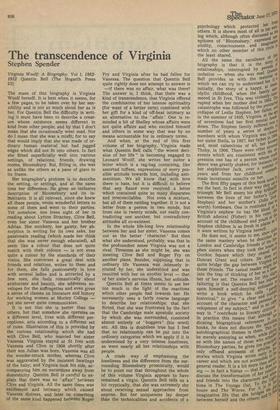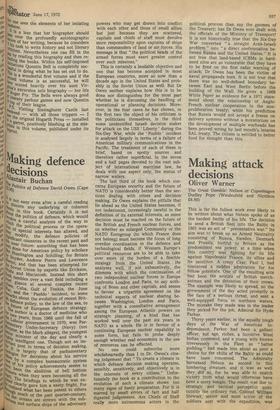The transcendence of Virginia
Stephen Spender
Virginia Woolf: A Biography. Vol I, 18821912 Quentin Bell (The Hogarth Press E3) The muse of this biography is Virginia Woolf herself. It is best when it seems, for a few pages, to be taken over by her sensibility and is not so much about her as is her. For Quentin Bell the difficulty in writing it must have been to describe a creature whose existence seems different in kind from other people; and by that I don't mean that she occasionally went mad. Nor do I mean that she was a misfit; for to say that would imply that she was made of ordinary human material but had jagged edges which did not fit into others. In fact she fitted superficially well into various settings, of relations, friends, drawing rooms, Bloomsbury. But, fitting in, she was as unlike the others as a pane of glass to its frame.
Her biographer's problem is to describe the setting, or settings, and at the same time her difference. He gives an inclusive description of Bloomsbury and its inhabitants. It is all relevant, since she knew all these people, wrote wonderful letters to some of them and went to their parties. Yet somehow, one loses sight of her in reading about Lytton Strachey, Clive Bell, even her sister Vanessa and her brother Adrian. Her mockery, her gaiety, her absorption in writing for its own sake, her passionate reading (which made her think that she was never enough educated), all seem like a colour that does not quite match with their colours — is not even quite a colour by the standards of their vision. She converses a great deal with friends and relations, writes to them and for them, she falls passionately in love with several ladies and is attracted by a few men, she feels romantically about aristocrats and beauty, she addresses envelopes for the suffragettes and even gives a series of classes on literature and history for working women at Morley College — yet she never quite communicates.
It is not that she is better than the others, but that somehow she operates on a different level, lives with different perceptions, acts according to a different set of rules. Illustration of this is provided by the curious relationship which she had with Clive Bell, who married her sister Vanessa. Virginia stayed at St Ives with Vanessa and Clive in 1908 shortly after their son Julian was born. Vanessa was all the wonder-struck mother, whereas Clive was aggravated by the insistent bawlings of the baby; and Virginia took his side, accompanying him on excursions away from domesticity. Quentin Bell is careful to explain that there was no 'affair' between Clive and Virginia. All the same there was excitement and intimacy which caused Vanessa distress, and later on something of the same kind happened between Roger Fry and Virginia after he had fallen for Vanessa. The question that Quentin Bell quite rightly does not attempt to answer is —if there was no affair, what was there? The answer is, I think, that there was a kind of transcendence, that Virginia offered the combination of her intense spirituality (for want of a better term) combined with her gift for a kind of off-beat intimacy as an alternative to the 'affair.' One is reminded a bit of Shelley whose affairs were not quite affairs and who excited himself and others in some way that was by no means accountable for in ordinary terms.
And when, at the end of this first volume of her biography, Virginia made what Quentin Bell calls "the wisest decision of her life" in becoming engaged to Leonard Woolf, she writes her suitor a letter which is a rag-bag containing, like assorted toffees, expressions of every possible attitude towards him, including antisemitism. We all know that with love there is hate, but it is difficult to believe that any fiancé ever received a letter which contained quite so many disparates and irreconcilables. Not even a mixture, but all of them rattling together. It is not a letter from a person in two minds, but from one in twenty minds, not really contradicting one another, but contradictory attitudes all co-existent.
In the whole life-long love relationship between her and her sister, Vanessa comes out as the better 'character.' But then what she understood, probably, was that in the profoundest sense Virginia was not a rival. Tiresome as she might be, she was meeting Clive Bell and Roger Fry on another plane. Besides, supposing that in ordinary life Vanessa was intensely irritated by her, she understood and was reunited with her on another level — that of her sister's nervous illness, her solitude.
Quentin Bell at times seems to see her too much in the light of the reactions which other people had towards her. He necessarily uses a fairly coarse language to describe her relationships: that she flirted, that she was frustrated by the fact that the Cambridge male apostolic society by which she was surrounded, consisted almost entirely of ` buggers ' (his word) etc. All this is doubtless true but I feel that no relationship can be put into the ordinary categories which we apply if it is undermined by a very intense loneliness, as were nearly all her relationships with people.
A crude way of emphasising the loneliness and the difference from the surrounding Bloomsbury promiscuity, would be to point out that throughout the whole of this volume Virginia appears to have remained a virgin. Quentin Bell tells us a bit cryptically, that she was extremely shy about receiving sexual approaches from anyene. But her uniqueness lay deeper than the technicalities and accidents of a which Jun psychology d her f others. It is shown most of all in her Wri,l; ing which, although often discussed as epitome of 'Bloomsbury,' expressed se,ni; sibilitY, consciousness and ilnagillati°.n which no shared. o other member of this circle the 1. All the same the excellence of thoisf biography is that it is the relationships, interrupted by Pesrtio°drysllt 9nf isolation — when she was mad. Quein Bell provides us with the material cis which we can try to understand her. It s initially, the story of a happY, at tirilenl: idyllic childhood, when the familY isnutermered in St Ives. This was violent' rupted when her mother died in 1892' ied _..timberrds, catastrophe was followed by the protrac collapse of Leslie Stephen, her father in the summer of 1895, Virginia, at th,e,.;a1(' ' 920 of seventeen had her first mental a down. The Stephen family suffered °ve of number of years a series of deat hst members with whom Virginia was 01904,her sister Stella, in 1897, her father in ther ' and, most calamitous of all, her events which are consistent exter.;,1 Thoby, in 1906. There were other pression one has of a person with thenio, whose c-tio dence was greatly shaken; for instance oi her stepbrother Jack, over a years and from her childhood on" made incestuous assaults on hen ir to The first fifty pages of this book seeee me the best. In fact in their way they triumph. Mr Bell steers his ship br',1--eslic between the lines of her father's V'pic1(, Stephen) and her mother's (Julia 1,qt 45 worth) forebears. One is reminded t"-of a Virginia's nephew he has the blond British admiral (Fisher) in his veitis'f the account of the childhood and youth °as if Stephen children is as fresh in Oces lf, it were written by Virginia herse do He does not, it seems to me, sh°,,w;the the same mastery when he describes te London and Cambridge friends of the phen sisters when they took the Gordon Square which they shared% flat Duncan Grant and others. Be '1°nel and, quite bridge the gap between Vitg:'4,-1 fsll these friends. The casual reader Ow' 0011" into the trap of thinking of her a5„3 s1igt1 ber of her set. The reason for t11`,"flinose' faltering is that Quentin Bell has J":ce to upon himself a self-denying ordi118"nurelY write a book which he calls, "trrilthi'll historical," to give "a clear ano "fi' de' account of the character and Pers„t oilier velopment of my subject," and lo way to "contribute to literary cr',;i) In practice this means that alth°'' her dicating biographical references 'f"0101g books, he does not discuss the 11,rfihis coa autobiographical themes in therm:1'0-104'dg be merely annoying as when, Wh",:tt.er4l,e,-) us with the names of those Nvh° Bloomsbury parties, he gives Oicle% a IN— ant' only offhand accounts of art tiet stories which Virginia wrote earlY Ito tile career and which are not accessible iipOY' general reader. It is a bit more than "es ot ing — in fact a hiatus — that he clation5 discuss the transformation a her r sitO: and friends into the characters and
t
tions in The Voyage Out, TOthe house and The Waves. For it 'stile01 itlir5 imaginative life that she bridges 'n'' between herself and the others, one sees th'e elements of her isolating Triadness.
is a loss that her biographer should over the profoundly autobiographic iiatktire of her writing, because he considers e !Its task to write history and not literary cism. Nevertheless one can fill in the rgaD by reading this biography and then reHeading the books. Within his self-imposed c.Thitations Quentin Bell is completely suc,"saful in doing what he has set out to do. is ttr se 8 Is a wonderful first volume and if the h,elpild volume is as successful, he will Di'v,e scored heavily over his aunt Viriero'f41' s excursion into biography — her life rhe Roger' Fry. The Bells were always good ted !,t IS literary parlour games and now Quentin ptoP of their league. age ! w.S. Visiting Sissinghurst Castle last . ak:4'ekend — with all those trippers — I r a W the original Hogarth Press — installed Of I a garret, positively blushing at the mis nnts in this volume, published under its 104, print











































 Previous page
Previous page